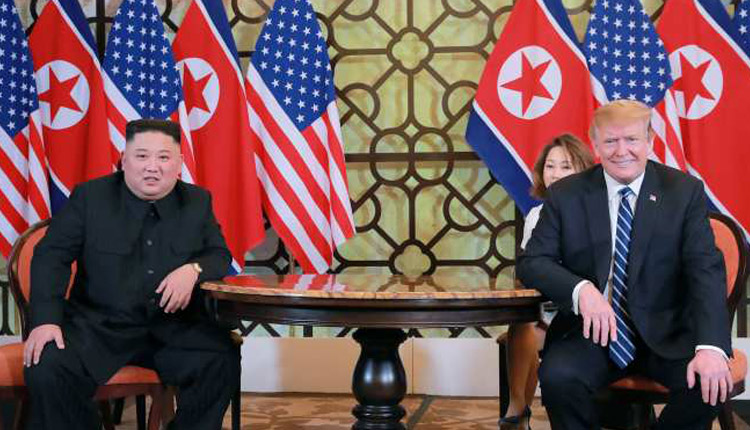U.S. President Donald Trump and North Korean leader Kim Jong Un on Sunday extended warm invitations to one another, exchanging lofty visions for the future as they met at the Demilitarized Zone (DMZ) separating the two Koreas.
The leaders shook hands on the North Korean side of the DMZ, making Trump the first sitting American president to ever set foot in the hermit state, before crossing together to the South Korean side and shaking hands again.
“It’s a great honor to be here,” Trump said, adding, “I feel great.” Upon leaving closed-door talks with Kim, he described the meeting as “very, very good.”
Kim said this was “an expression of his willingness” to work toward a new future.
While the two spoke of reconciliation and diplomatic progress, Trump said that U.S. sanctions on the country over its nuclear weapons and missile development programs would stay for now. The leaders agreed to designate a team to work out the details of future negotiations, Trump said, adding that the U.S. team would be headed by Washington’s nuclear envoy Stephen Biegun and that work would begin “over the next two or three weeks.”
The sticking point between the historical adversaries has long been the issue of denuclearisation, a term whose definition the two countries can’t seem to agree on. Washington wants Pyongyang to give up its nuclear weapons, while Kim and his predecessors view the term to mean broader concessions from the U.S., including the removal of its troops from the Korean peninsula.
Trump made the surprise announcement just hours earlier of his intention to meet Kim at the Joint Security Area patrolled by soldiers from both Koreas near the inter-Korean border. Sunday also marks the first meeting between American and North Korean heads of state at the historic border since a cease-fire was signed ending the Korean War in 1953.
The meeting, which comes on the tails of the G-20, is the third between the two leaders in just over a year. The most recent, in Hanoi, Vietnam in February, collapsed due to disagreements over U.S. sanctions on Pyongyang.
An invitation to the White House
The U.S. president said he invited Kim to the White House during their private talks Sunday, while the two agreed to visit one another’s countries “at the right time.”
“I would invite him right now to the White House,” Trump said, to which the North Korean leader responded that it would be a great honor if Trump visited Pyongyang. Kim expressed his desire to “leave behind the past and move toward the future,” according to Reuters.
“It’s a great day for the world,” Trump said, adding that he was proud to step over the border line. “The world is watching. It’s very important to the world,” he said, before stepping into private talks with Kim and South Korean President Moon Jae-in. Moon joined both leaders shortly after he and Trump visited a guard post in the northernmost part of the South Korean side of the DMZ.
Kim lauded the positive relationship between the leaders, saying that Sunday’s meeting would have been “impossible” without “the great relationship between us,” Reuters reported. Moon echoed Kim’s words, attributing what he called a historic meeting to Trump’s “bold move.”
The Trump administration, like several U.S. administrations before it, is endeavoring to put an end to North Korea’s nuclear program. The reclusive country has carried out several nuclear weapons tests in recent years and developed long-range missiles capable of hitting targets thousands of miles away.
Trump appears to have established a personal camaraderie with the North Korean strongman and has voiced optimism about potential for an agreement, though physical progress on the dismantling of the North’s nuclear facilities has yet to be seen. U.S. intelligence agencies earlier this year reported that North Korea has begun rebuilding key missile testing facilities for its intercontinental ballistic missile program, reversing a prior moratorium on missile development that Trump had hailed as a foreign policy success after his first meeting with Kim in Singapore in June of 2018.
Source: Reuters & CNBC
